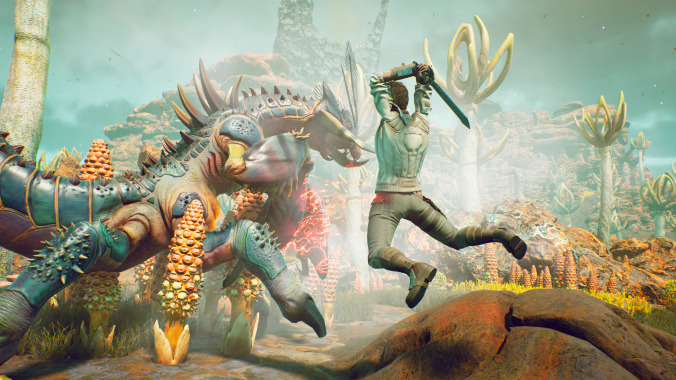For a far-flung space opera, The Outer Worlds treads depressingly familiar ground


Every Friday, A.V. Club staffers kick off our weekly open thread for the discussion of gaming plans and recent gaming glories, but of course, the real action is down in the comments, where we invite you to answer our eternal question: What Are You Playing This Weekend?
It would be a stretch to call The Outer Worlds—the sprawling new sci-fi RPG shooter from Obsidian Entertainment—a game about cannibalism, per se. In practice, it’s mostly actually about running around a variety of beautiful science-fiction landscapes, shooting monsters, navigating hazards, and occasionally solving the interpersonal problems of a host of dysfunctional people. Or you could describe it as a game about finding middle choices between extremes, pretty much regardless of what those extremes might happen to be. It’s a game about talking to charming companions and helping them through minor personality conflicts. It’s a game about what capitalism does to people’s brains. And it’s a game about searching through roughly 10,000 different little boxes, hunting for more ammo to feed into your ever-hungry guns. (It’s a lot about that last one, if we’re going by sheer tonnage of play time here.) In practice, The Outer Worlds is a pristine example of the “shooting, talking, opening little boxes” genre of games, i.e., the sort of material formalized by predecessors like Oblivion and Fallout 3. The cannibalism stuff just leaks in around the edges.
But when it leaks, it pours. Obsidian’s latest is set in the interstellar colony of Halcyon, a corporate-owned vision of post-scarcity society that swiftly reveals itself to be anything but. You play as a refugee unfrozen from a lost colony ship, i.e., an outsider from a better, less overtly branded time. Abruptly injected into a society where product slogans and corporate jingles are considered a natural part of speech, you wander across multiple planets’ worth of big-business dystopia, places where every town is a company town kept under rigorous but incompetent bureaucratic control by the force of off-world middle management. All the buildings you walk into, the armor you pick up, the guns you wield—even the food and medicines that keep people alive—are slathered in corporate logos and slogans. (The latter might help explain why almost every colonist you meet is some combination of crazy, hungry, or sick.) In ways both great and small, the societies you encounter in The Outer Worlds are engaged in some form of capitalistic auto-cannibalization; even one of the “good” outcomes you can dig up for an early quest involves convincing a town to dis-inter its dead as part of a desperate effort to stave off self-inflicted starvation. The message is blunt, but in a welcome sort of way: Giving your life over to “the company”—any company—is just another way to line yourself up for the slaughter.
The baked-in nature of its satirical worldview—think Idiocracy in space, but with more anti-corporate leanings, and gunfire—is one of The Outer Worlds’ biggest strengths. Halcyon feels comprehensively, and specifically, hellish, from the people dying because their bosses deemed them too unprofitable for medical treatment, to numerous instances of companies monitoring speech or cutting and running on employees the second their bottom line started to dip. It bolsters this carefully constructed world with well-crafted writing, a firm comedic tone, and a number of well-designed members for your crew. (Parvati, the gently sweet engineer you can Cyrano through the tentative steps of her first romance with a fellow gearhead, is an especial delight.) Obsidian is made up of veterans of this sort of wide-focus game design; lead designers Tim Cain (Fallout) and Leonard Boyarsky (Vampire: The Masquerade—Bloodlines) have some of the most beloved Western RPGs of all time on their résumés. As such, they’ve got a long track record of creating interesting worlds for players to run and gun through, solving various moral and logistical problems as they go. That experience shines here, especially in the early going, as you sink back into the rhythms of this sort of “seek problem, solve problem” gameplay. For players starved of a particular breed of Fallout-inspired content, the initial rush will be nigh-overwhelming. But as the game progresses, it starts feeling like that level of familiarity may have also bred a certain degree of contempt.
There’s more than one form of metaphorical cannibalism, after all. The real bummer at the heart of The Outer Worlds’ varied faults is that the numerous older game design ideas it dines out on—or possibly just regurgitates—don’t even come from Obsidian’s own output. This is the studio that created Fallout: New Vegas and Alpha Protocol, games that recognize, like few others, the importance of subverting players’ expectations and respecting their choices. But The Outer Worlds doesn’t do that. Instead, it pairs its satirical worldview with a conservative design mindset that’s borderline Skyrim-esque in terms of sticking to the dead center of the middle of the road. If someone asks you to do something in Halcyon, that’s pretty much what you’re going to end up doing—and don’t expect much in the way of surprises to crop up along the way. Sure, someone might make you a better offer, or your quest giver might reveal that they were lying about a minor detail. But it’s always first-order stuff, a thoroughly expected twist that you’ve likely seen a dozen times before. The game’s sci-fi setting sketches out a possibility of vast and distinctive stories…then proceeds to tell you a whole bunch of ones you’ve almost certainly heard before. Hell, it even—not to hit this whole cannibalism thing too hard on the head, but really, get a load—indulges in the apparently mandatory-to-include-in-a-game-like-this quest that sends you to investigate a cheerfully mysterious family of off-the-grid weirdos, the kind who make endless puns about “having you for dinner.” Wouldn’t you know it: It turns out that they’re cannibals! (It’s like no one’s even bothered to play West Of Loathing’s genius riffing on this now-thoroughly marinated trope.)
Meanwhile, that unwillingness to push itself against well-worn boundaries also crops up in how the game approaches important issues like morality and choice. No Witcher-esque ethical quandaries here: The game-applauded answer to almost any problem is to suggest and enforce compromise, while rejecting corporate control—i.e., the default “good” answer games have been churning their way through for the better part of 30 years. It’s a good enough message, sure, but also one that’s utterly and deathly boring—especially when one of the most interesting things a work of speculative fiction can do is to give its players a set of unprecedented moral and social conundrums to shove their brains against. (And this is more of a personal quibble, but TOW’s eagerness to fall all over itself praising you for doing the “right” thing” is mildly embarrassing in and of itself. It’s hard to remember the last game that was so effusive in telling its player that they were the best or most important person in the world just because they picked the proper text-box prompt.) For all the colors of its alien landscapes, the design of The Outer Worlds is borderline monochrome, a throwback to less emotionally complex titles like Bethesda’s Fallout 3. (Said comparison isn’t helped by the fact that the game’s slow-motion alternative to that earlier title’s beloved V.A.T.S. system is an especially blatant lift.) If you’re going to steal from someone, why steal from people who’ve been putting out lesser imitations of your work for years?
For all those complaints, though, The Outer Worlds is still inherently satisfying—with much the same filling sensation that a brightly wrapped candy, fortified with just a hint of sawdust, might manage to achieve. It’s undeniably fun to run and sneak and shoot on planets like Monarch and Terra II. (Even if the combat, which often devolves into simple spray-and-pray tactics, does eventually get more monotonous than it initially seems it might.) It’s fun to employ your skills and perks to get around obstacles, or talk people into doing what you want. (Even if the magnitude of their pliancy, again, starts to make your choices feel mechanical and forced.) It’s fun to stand on a clearly alien planet, staring up at a looming gas giant hovering overhead. (A sense of galactic grandeur the game shares, along with a whole bunch of letters in its title, with this year’s earlier Outer Wilds.)
And yet, it’s hard not to notice how relentlessly empty these beautiful playgrounds actually are—as though someone was told they needed big, expansive maps as a back-of-box selling point, with no real concern for having enough actual material to justify all that space. There’s nothing here to compare with Fallout’s Vaults, for instance, which often serve as self-contained short stories, rewarding players with ghost stories or comedy pieces in exchange for their monster-hunting work. Instead, your biggest reward for stumbling onto an abandoned outpost full of acid-spitting lizards or space-maddened raiders is almost always just a fresh pallet of boxes of bullets to glumly sort through. The writing that’s there is good—it’s the writing that’s absent that galls.
The Outer Worlds is not a game about cannibalism. But it is a game where cannibalism happens, repeatedly, both inside and outside its science-fiction universe. It’s a game where the rich feast upon the poor, brainwashing them with jingles as they break their backs for meager gains. It’s a game where once-ambitious RPG designers take bites out of older, ostensibly more successful titles, rather than preparing a meal on their own merits. It’s a game about what happens when you give up on self-sufficiency, and focus, on, well, self-sufficiency. And while some of that critique of the allure of lazy auto-cannibalism is pointed and intentional, some of it is not. The disconnect between the two versions of itself stops The Outer Worlds from being a truly great game, in the tradition of plenty of titles you could play right now from the people who made it.
And yet it expresses a certain irresistible quality, nevertheless. It’s been nine years since New Vegas. Fallout 76 couldn’t scratch the itch. When you’ve been starved of this kind of material for so long, it’s hard to resist the idea that any meat, regardless of its more dubious qualities, will probably do in a pinch.